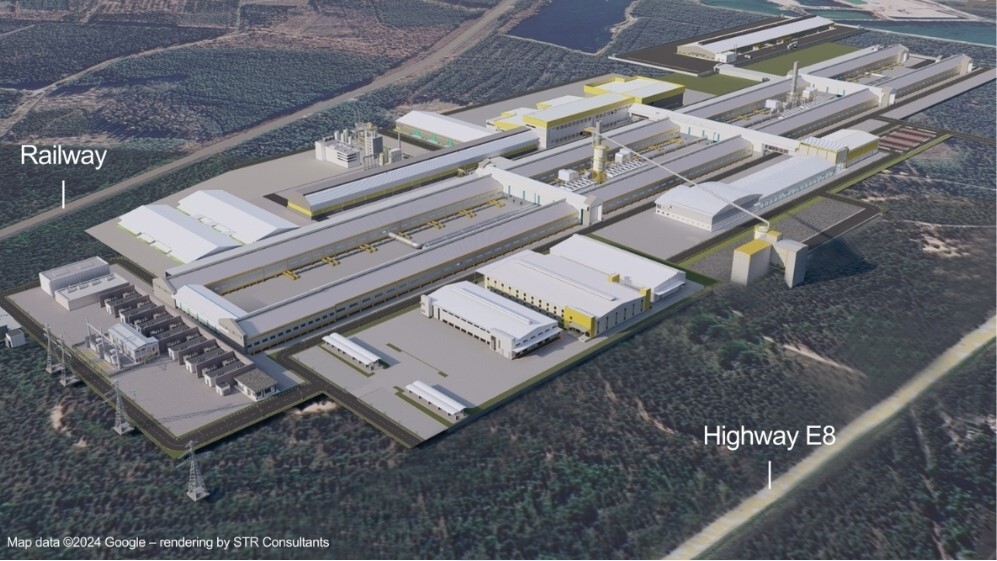您想继续阅读英文文章还
是切换到中文?
是切换到中文?

THINK ALUMINIUM THINK AL CIRCLE

The European aluminium industry has set its sights on an ambitious future with Vision 2050 a bold roadmap aimed at building a carbon-neutral, circular, and energy-efficient aluminium value chain by mid-century. On paper, the plan is visionary and inspiring but in practice, however, the journey ahead is fraught with challenges that demand urgent and decisive action.

By 2050, global demand for primary aluminium is projected to surge by 50 per cent, reaching 107.8 million tonnes. To meet Europe’s growing needs sustainably, Vision 2050 calls for a carefully balanced approach that combines primary aluminium production with increased recycling efforts.
Low-carbon aluminium production in Finland
This urgency is already being felt as demand for low-carbon aluminium accelerates, driven by the global energy transition, ambitious decarbonisation goals set by end-users, and the growing focus on lightweight materials. Adding to this momentum, geopolitical factors and supportive regulatory frameworks are amplifying the call for domestic aluminium production in Europe, making the development of a greenfield facility in the region an increasingly compelling opportunity.
Responding to this rising demand, project company Arctial has launched an industrial and investment partnership to carry out a feasibility study for low-carbon aluminium production in Finland. If realised, the Arctial aluminium smelter would become the first new primary aluminium facility built in continental Europe in over three decades marking a major step forward in reinforcing the region’s supply chain resilience.
The proposed smelter will have an annual production capacity of 550,000 tonnes of low-carbon primary aluminium, leveraging Rio Tinto’s advanced AP60 reduction technology, and is slated to commence operations by 2029.
Arctial has selected a strategic site spanning Kokkola and Kronoby in Finland, an area distinguished by its rich industrial heritage in minerals. The location provides access to CO₂-free electricity, the Port of Kokkola, and an optimised infrastructure and logistics network. It further benefits from a skilled local and regional workforce, complemented by international expertise and cutting-edge technologies.
Also Read: Relief with a catch: Europe sees scrap leakage risk in US tariff exemptions
“Working in partnership across industrial supply chains is a critical part of our strategy,” said Torbjörn Sternsjö, CEO of Arctial. “Our commitments through collaboration bring invaluable strategic insights, increased knowledge and additional networks. We’re looking forward to the results of what we will achieve together with our investment partners.”
As part of this groundbreaking initiative, ABB will lead the feasibility assessment for electrification and automation, having joined Arctial’s project management organisation as an investor. ABB will work alongside a consortium of global industry leaders including Fortum, Mitsubishi Corporation, Rio Tinto, Siemens Financial Services, Tesi, and Vargas to conduct detailed feasibility studies for the Greentop low-carbon aluminium smelter in Finland. Signed in the first quarter of 2025, this landmark agreement is viewed as a pivotal step in strengthening Europe’s materials supply chain.
Use of AP60 technology
Rio Tinto, as the strategic industrial partner, will bring its industry-leading AP60 technology to the Arctial partnership marking the first deployment of AP60 in an aluminium smelter outside Quebec, Canada. Renowned as one of the most efficient aluminium smelting technologies currently available at commercial scale, AP60 aligns perfectly with the project’s vision of delivering low-carbon, high-performance production solutions. It also underscores Rio Tinto’s commitment to advancing sustainable innovation within the aluminium sector.
The Arctial project envisions leveraging low-carbon energy from existing and new renewable infrastructure while drawing on the expertise of both local and global industry partners. ABB’s team will deliver front-end engineering and design (FEED), early works packages, budget and timeline planning, and safety risk assessments laying the foundation for an operation designed to be energy- and resource-efficient, reliable, and safe.
“As a partner with early involvement in Arctial’s low-carbon aluminium project we intend to bring not only investment but also our generations of expertise,” said Joachim Braun, Division President, ABB Process Industries. “We have gained insight into the impacts this project can have across the European supply chain for industries and everyday consumers. We believe that our technological influence can help this development become reality.”
Arctial plans to make a final investment decision (FID) on the smelter between 2026 and 2027, following this extensive feasibility phase. The study represents a critical first step towards bringing this transformative project and Europe’s Vision 2050 aspirations to life.
Image Source: https://www.arctial.com/
Responses








